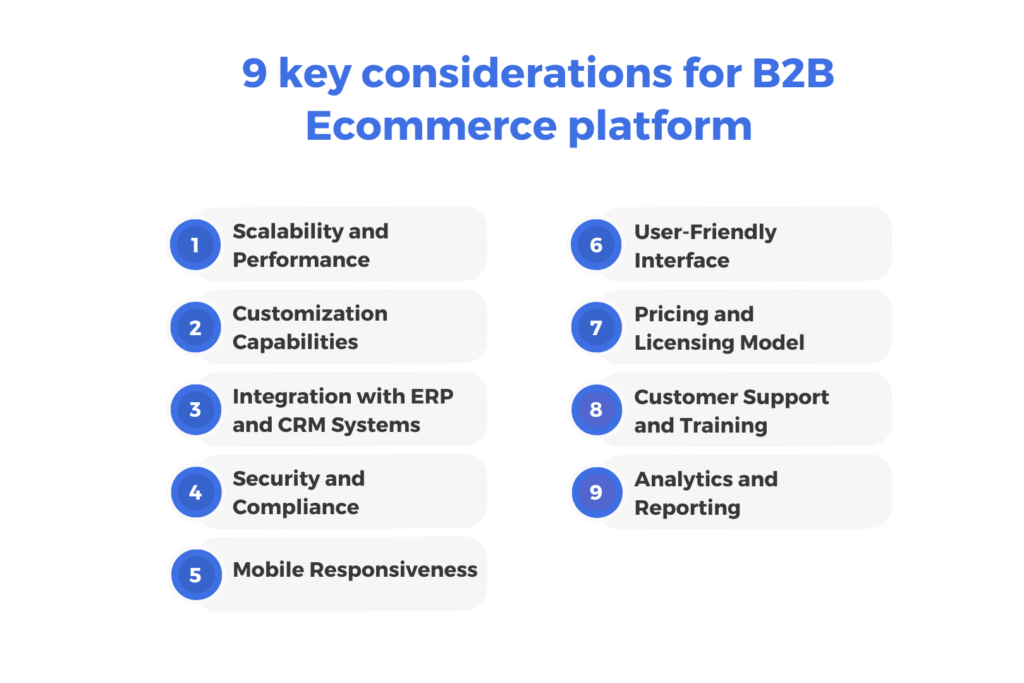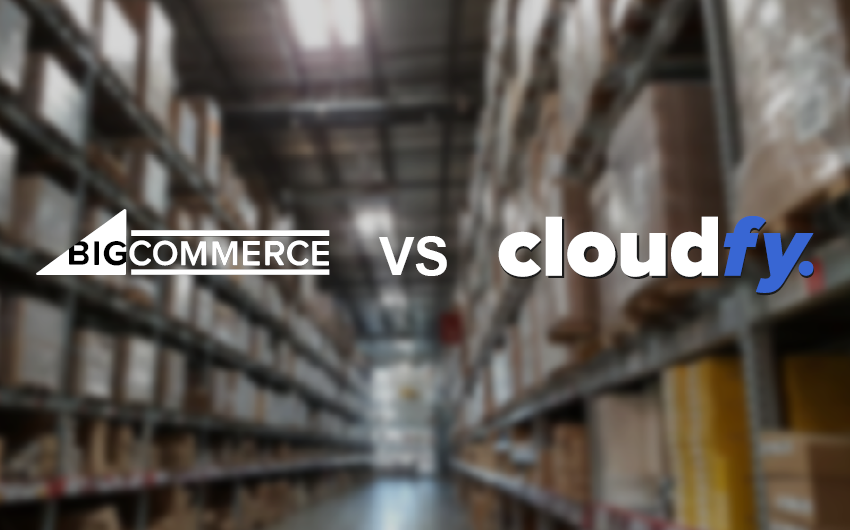Introduction
In the rapidly evolving world of B2B ecommerce, choosing the right platform is a critical decision that can significantly impact the success of your business. A well-suited B2B ecommerce platform not only provides a seamless shopping experience for your customers but also streamlines your operations and enhances overall efficiency. In this blog, we’ll explore the key considerations to keep in mind when choosing the right B2B ecommerce platform for your business.
Table of Contents
Scalability and Performance
One of the primary factors to consider is the scalability of the platform. Your B2B ecommerce platform should be capable of handling the growth of your business without compromising on performance. As your customer base and order volume increase, the platform should seamlessly accommodate the higher demands without experiencing significant downtime or slowdowns.
Customization Capabilities
Every B2B business is unique, and your ecommerce platform should reflect that. Look for a platform that offers extensive customization options to tailor the user interface, product catalogs, pricing structures, and workflows to match your specific business needs. A flexible platform will enable you to create a branded experience and adapt to changing market trends.
Integration with ERP and CRM Systems
Efficient integration with your existing ERP (Enterprise Resource Planning) and CRM (Customer Relationship Management) systems is crucial. A seamless data flow between these systems and your ecommerce platform ensures real-time updates on inventory, pricing, customer data, and order information. This integration streamlines processes, reduces manual errors, and enhances overall productivity.
Security and Compliance
Security is paramount in B2B ecommerce, where sensitive information such as customer data, payment details, and order history is exchanged. Choose a platform that complies with industry standards and offers robust security features, such as SSL encryption, data backups, and PCI DSS compliance, to safeguard your business and customer data from potential threats.

User-Friendly Interface
A user-friendly interface is critical to provide a seamless and intuitive shopping experience for your customers. The platform should be easy to navigate, with clear product categorization, advanced search options, and a streamlined checkout process. A cluttered or confusing interface may discourage customers from completing their purchases.
Pricing and Licensing Model
Consider the pricing and licensing model of the ecommerce platform. Some platforms charge a monthly or annual fee, while others operate on a transaction-based model. Analyze your business’s financials and choose a pricing structure that aligns with your budget and anticipated sales volume.
Customer Support and Training
Reliable customer support and training resources are vital, especially during the initial setup and ongoing usage of the platform. Look for a provider that offers responsive customer support, comprehensive documentation, and training materials to help your team make the most of the platform’s features.
Analytics and Reporting
Data-driven insights are instrumental in making informed business decisions. An effective B2B ecommerce platform should offer robust analytics and reporting capabilities to track sales performance, customer behavior, and inventory levels. These insights will enable you to identify trends, optimize strategies, and refine your operations.
Conclusion
Selecting the right B2B ecommerce platform is a critical step in establishing a successful online presence for your business. By considering factors such as scalability, customization, integration, security, and user-friendliness, you can make an informed decision that aligns with your business goals and objectives. Remember that the right platform should not only cater to your current needs but also have the flexibility to adapt and grow as your business expands. Take the time to research, compare, and test different platforms to find the perfect fit for your B2B ecommerce journey.
Cloudfy is a game-changer for your B2B ecommerce journey, offering a comprehensive solution to elevate your business to new heights. With its scalable infrastructure, seamless integration with ERP and CRM systems, and robust security features, Cloudfy ensures smooth operations and data flow, saving time and minimizing errors. The platform’s user-friendly interface and extensive customization options create a branded experience tailored to your business needs. Additionally, Cloudfy’s mobile responsiveness guarantees an optimal shopping experience for your customers on any device. With Cloudfy’s dedicated customer support, transparent pricing, and advanced analytics, you can make data-driven decisions and thrive in the competitive B2B ecommerce landscape. Schedule a demo to know more!
Frequently Asked Questions
Selecting the right B2B Ecommerce platform is crucial because it directly impacts the success and growth of your business. The platform you choose should accommodate the growth of your business, offer customization to match your unique needs, and integrate seamlessly with your existing systems. It should also prioritize security to safeguard sensitive data and provide a user-friendly interface to enhance customer experiences.
To ensure scalability and performance, look for an Ecommerce platform that can handle the increasing demands of your business without compromising on speed and efficiency. The platform should be capable of handling higher customer volumes and order quantities without experiencing downtime or slowdowns. Robust infrastructure and reliable hosting are essential factors to consider.
Every B2B business has unique requirements, so it's essential to choose a platform that offers extensive customization options. Look for the ability to tailor the user interface, product catalogs, pricing structures, and workflows to align with your specific business needs. A flexible platform will enable you to create a branded experience and adapt to changing market trends.
Efficient integration with your existing ERP and CRM systems is crucial for streamlining processes and enhancing productivity. Seamless data flow between these systems and your Ecommerce platform ensures real-time updates on inventory, pricing, customer data, and order information. This integration reduces manual errors and provides a unified view of your business data.
Security is paramount in B2B Ecommerce, where sensitive information is exchanged. To ensure security, choose a platform that complies with industry standards and offers robust security features like SSL encryption, data backups, and PCI DSS compliance. Regular security audits and updates are also essential to safeguard your business and customer data from potential threats.
Mobile responsiveness is essential because more and more buyers prefer to browse and make purchases using smartphones and tablets. A mobile-friendly platform ensures that your customers have a seamless experience regardless of the device they use, ultimately leading to higher customer satisfaction and increased sales opportunities.

Picking the best Sales Rep Ordering app for your B2B business
Here we look at Cloudfy versus some of the other leading sales rep ordering apps you might like to consider. … Read More

How much does it cost for a B2B ecommerce platform?
Even using ‘free’ ecommerce platforms will involve investment in expertise, planning, implementation, and maintenance, so how do you assess the real cost? … Read More

When to choose Cloudfy vs BigCommerce for my B2B ecommerce business
BigCommerce is popular with fast growing businesses and can be setup quickly for basic requirements. But, if you want to access all its B2B functionality, you will need specialist expertise. … Read More






